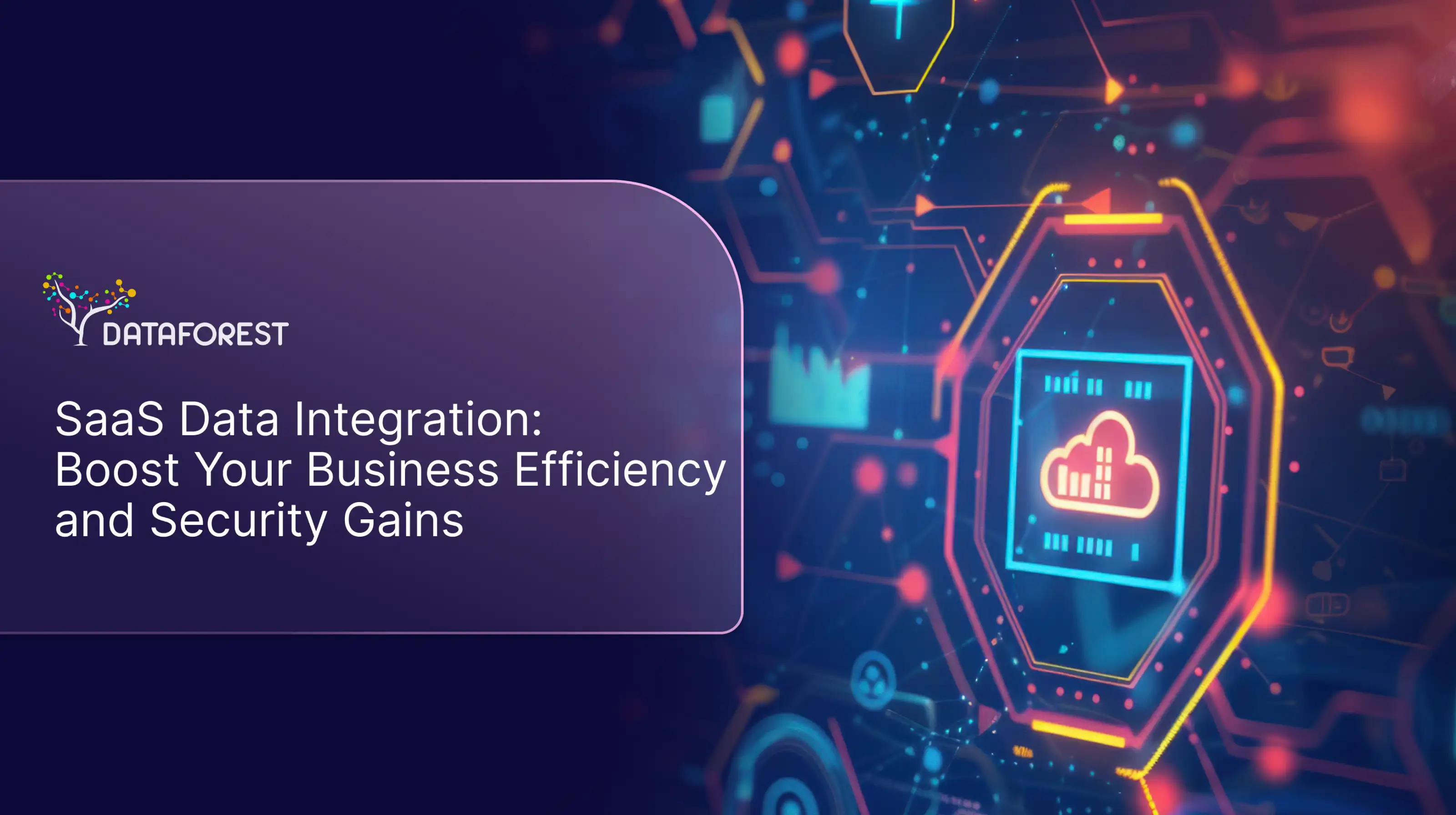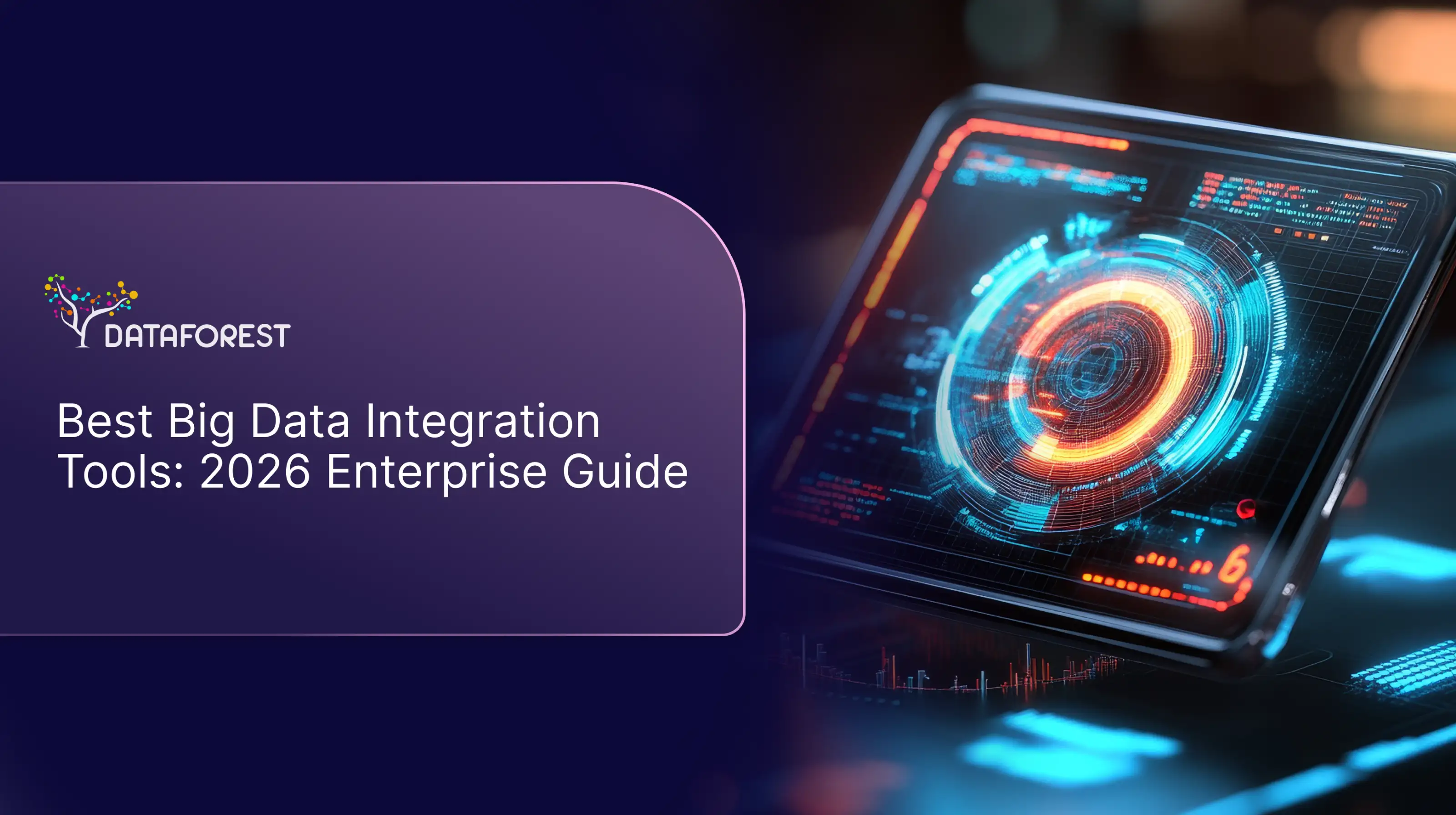In the modern world, businesses seek to maximize efficiency and stay competitive. From small startups to large enterprises, e-commerce uses APIs daily.
One reason that APIs enable businesses to achieve their goals faster is that, by adopting and using them, they deliver a big competitive advantage — access to real-time data from any source. This, in turn, leads to the creation of useful apps that can help customers manage their orders or find the products they seek.
Dataforest.ai provides cloud-based, AI-driven software solutions and API integration services for e-commerce companies worldwide. Creating and integrating APIs is vital to building a scalable, data-driven e-commerce business. We see a shift towards custom e-commerce APIs daily, but why? If you think this is your case, then arrange a call.
Data Collection for E-commerce Business With a Custom API Integration
Data is everywhere and used by everyone—from small-town shops to big-name brands. Many businesses are hosting their e-commerce platform within Amazon, Walmart, Shopify. Each of these platforms has its own way of gathering data from performers, but none of their approaches gives the complete picture of your business performance.
E-commerce APIs allow businesses to incorporate multiple sources of real-time data into a centralized system—and use this consolidated store to build a more accurate picture of what's happening in business processes.
In this article, Dataforest.ai will walk through an e-commerce API integration, explain how it works, provide API models used in today's market, and explore the pros and cons of building custom APIs for your e-commerce integration project. This article will help you understand how to integrate your e-commerce platform with various data sources. We'll explore the pros and cons of each integration, as well as answer questions about how to make the most out of your API integrations.

What Are the Сustom E-commerce APIs?
An API (Application Programming Interface) is a set of routines, protocols, and tools for building software applications. It documents and implements a link between two separate pieces of software. E-commerce owners are rapidly adopting APIs to connect their systems with other e-commerce applications. Many companies rely on them for their day-to-day operations. APIs help sell products, manage inventory and orders, and more.
For example, if you have a website, you might use an e-commerce API to connect it with your payment processor so they can work together seamlessly. E-commerce APIs allow merchants to plug their data into websites, apps, and other platforms to improve customer experience.
Another example of this connection is when a company uses an API from Google Analytics or Facebook Audience Network. Or, if businesses have multiple warehouses worldwide, they use e-commerce API to connect those warehouses with inventory systems, providing a single view of inventory status and keeping everything up-to-date across all locations at all times. The possibilities are endless!
There are two main types of e-commerce APIs: data source and product APIs.
- Data source APIs allow access to the raw data stored by your platform (like customer information)
- Product APIs give access to specific objects like products or orders.
Some venues offer both types of APIs, while others offer only one or the other.
What e-commerce Platform APIs Offer to Businesses
E-commerce Platform APIs are a great way to connect your business with the rest of the world. They can help you gain deeper insight into what your customers behave, are searching for, and need while also allowing you to automate tedious tasks like inventory management.
Custom e-commerce integrations allow you to connect an external system with your store’s database, so it can take advantage of all the functionality your e-commerce platform provides.
You can adopt the most powerful and flexible APIs for your e-commerce platform. They can allow you to build custom integrations with other software and enable new features that were not available within the core product.
Some of the essential e-commerce APIs include:
- BigCommerce API
BigCommerce is a cloud-based e-commerce platform that empowers you to sell anywhere, in any language or device. BigCommerce APIs make it easy to design and set up your store, manage inventory, create marketing campaigns and run promotions across social media channels.
- eBay API
eBay is one of the world's largest e-commerce platforms. This makes it an invaluable resource for anyone looking to start their e-commerce store or expand an existing business into new markets. It has several APIs, including the eBay Product API, which allows you to search for and retrieve product listings from their marketplace. The API also allows you to pull data about your listings, shipment tracking, and import inventory information into your system.
- Walmart API
This API allows you to access Walmart's products and services. The API provides tools for developers to access data about retail offers, promotions, and services available at Walmart. It also enables you to retrieve information about your store's performance and manage inventory and sales tax.
- Shopify API
Shopify API is a platform that allows building e-commerce merchants' APIs and e-commerce stores and managing their business. The API exposes storefront data such as products, customers, and orders.
Other popular APIs include PayPal and Amazon Web Services (AWS).
Not all APIs are free to use. Paid API services have more features than free ones and tend to have fewer bugs.
But what if your needs are more advanced or specific than the market's ready-made solution? Business owners can consider creating and outsourcing custom e-commerce APIs integration solutions in such cases.
Creating custom e-commerce APIs is a great way to centralize your business' operational turnover data, allowing you to make better decisions based on real-time information. Once implemented, the API will allow you to run reports on your turnover, analyze customer behavior and make decisions based on this data. It also facilitates the implementation of new features and functionalities in your store. Custom e-commerce APIs are an integral part of the digital ecosystem.
Setting up an e-commerce API integration may exceed the time it takes to build a custom solution using another technology (like an app or custom software). However, once it's set up, an e-сommerce API integration will save you money by reducing the resources required to run your business. Many routine tasks will be automated instead of requiring manual input from employees or customers every time something happens with an order or shipment, etc. You can use a headless agent to integrate with existing on-premise environments without developing custom APIs. This is useful for customers who want to deploy the same API integration across multiple e-commerce platforms but don’t have the resources to build them from scratch.
API Overview: How Do E-commerce APIs Work?
If you're wondering how an e-commerce API works, it's essential to understand what it is and what it means to your business. At a basic level, an API is a way of sharing data across systems.
The most common use of API is between a web application (like your e-commerce site) and a database (like your backend order management tool). Once you have an API set up, the two systems can communicate with each other in real-time.
E-commerce APIs are an integral part of the business workflow. They connect all systems and centralize data so that you can analyze it and make informed decisions based on that information.
One of the most important aspects of running an online store is ensuring customers are happy with the end-to-end experience. You need to offer them a great shopping site, with compelling products, fast and efficient delivery times and an easy checkout process. One way to achieve this is by using an e-commerce platform that integrates with third-party APIs such as Amazon or eBay.
E-commerce API provides functionality for users to make requests and receive responses in a variety of formats, including XML and JSON. These responses can include information about products, orders placed, inventory levels, shipping information, and more.
The API has a set of rules that developers must follow to ensure the security and integrity of the data. The API also provides documentation on making requests using specific parameters and expects responses in a particular format. This ensures that all third-party applications work in harmony with each other, guaranteeing a consistent experience for users.
Most e-commerce APIs are designed as RESTful services. A RESTful service is a software architecture that uses HTTP requests to communicate with the server and return data in response to those requests. This makes it easier for developers who need to learn how the server is implemented.
When you call an e-commerce API, you'll make an HTTP request using GET or POST methods. The data, representing the request and response, will often be encapsulated within a JSON structure. JSON is widely used because it's easy to parse and understand by humans and machines alike. There are many other encapsulation formats available, such as XML or CSV formats.
An e-commerce API allows you to access product data in various ways depending on what you're trying to achieve with your application or website.
Not a coder? Not a problem. Let DATAFOREST do the back-end technical part of creating custom e-commerce APIs for your business! Our end-to-end data integrations services allow you to transform, optimize, and scale your business easily!

Common Types of API Models
There are three main types of e-commerce APIs: experience, process, and system.
Experience API
These APIs connect users with a brand's online presence, allowing them to create a unique experience on their terms while still being connected to the brand in some way.
Process API
These are used for creating the back end of an e-commerce platform or website. They allow developers to create custom processes that different e-commerce platforms or websites can use.
System API
These APIs provide access to information about products and customers that can help businesses run their operations more efficiently.
Different Types of E-commerce APIs
Owning a business is hard, and making it efficient and profitable is harder still! Managing employees, risk analysis, and organizing the necessary operations are all essential processes. Luckily, companies have more than one tool at their disposal and more than a few resources to lean on.
Depending on an enterprise's needs, there are many e-commerce APIs that can be valuable. Here are some of the most common:
Product information API
A product information API provides product information from a third-party website or database. This includes product details such as name, description, price, etc. An example of a product information API is the Amazon Product Advertising API which provides access to product metadata such as images, titles, descriptions, and more.
Orders API
An orders API allows you to create, retrieve and update orders placed on your store by customers.
Inventory API
This inventory management system helps track all products and their availability. Businesses can also use it to automate their inventory to update as products sell or become available automatically.
Shipping API
This shipping management system implements many useful features:
- The tracking of orders and shipments
- Calculation of taxes and other fees for international shipments.
- Information about tracking numbers for each order so that you can see where an item is in transit at any given time.
Couriers API
This courier management system allows tracking courier deliveries from start to finish—from pick up to delivery—so that you know exactly where packages are and when they'll arrive at their destination. It also allows the sending of messages directly through the courier company's app so that customers receive them immediately instead of waiting until tomorrow or later today (depending on how long it takes for delivery).
Wrapper API
A wrapper API is a set of instructions for using and interacting with the API. It’s also called an SDK or client library. Its purpose is to provide host platform-friendly code which allows access to the API.
Channels API
A channel API allows you to integrate with a specific channel on an e-commerce site, such as eBay or Amazon. This means that if you want to tap into one of those two platforms specifically, this is the type of API you want.
Catalog API
A catalog API allows you to access product information in their catalogs (what they sell), including product images, descriptions, and prices. You can also use this type of API for managing inventory and orders.
Authentication/Login API
An authentication/login API helps users sign up for accounts and manage them within your application by providing customer support services directly instead of through another channel like email marketing campaigns where customers will have no control over their experience on either side!
Content Management Systems (CMS) API
These allow companies to manage content from multiple platforms in one place. This can help coordinate campaigns across different channels like social media or email marketing.
Payment API
The payment API allows payments to be accepted from customers through an online store. It also allows for recurring billing, enabling customers to be charged monthly for a subscription.
Validation API
The validation API checks that all products are valid and available before they are shipped. If something is not available or defective, this will let you know before shipping so that both parties are satisfied with the transaction. This saves time and money by avoiding unnecessary returns or exchanges later down the road!
Marketing API
The marketing API integration provides access to your customers' spending habits and recommendations for future purchases based on previous purchases! This helps you keep track of customer preferences over time so that when someone visits your site again, they'll get recommendations based on something similar instead of something random that doesn't suit their tastes at all.
Implementing and managing sales and order management systems can be a nightmare for many businesses. DATAFOREST's unified data integration and web applications approach simplify managing stocking, pricing, inventory, invoice generation, and reconciliation. Request a free consultation!
Why Are E-Commerce APIs Solutions Essential?
It can be tough to stand out from the crowd. The e-commerce market is saturated and has become increasingly competitive over the years. One of the best ways to set yourself apart from your competitors is to create a customized customer experience.
This is where e-commerce APIs solutions come in handy. By using an API integration, you are not only creating a unique customer experience, but you are taking complete control over your data and how you use it.
Here are some of the top reasons for businesses to choose an e-commerce APIs solution:
- Connect with customers more effectively by providing a mechanism to integrate data from multiple channels into one central location.
- Generate revenue from selling products through third-party websites without investing in developing an entire proprietary shopping cart platform.
- Improve the customer experience by making it easier for customers to find, buy, and receive their products.
- Get access to data relevant to their business model.
- Streamline processes by automating manual tasks and making the operation more efficient.
- Gain access to new markets by streamlining payments, inventory management, order fulfillment, etc., across various platforms like Amazon, eBay, or Shopify.
- Deliver personalized services across sites. Improve your search engine rankings and track users' behavior and emotions while capturing data at every digital touch point.
- Calculation of sales taxes rates on a product and displays the total price in the user’s shopping cart. This lets your customers know exactly how much they will have to pay for their orders.
Let DATAFOREST handle the heavy lifting with your data science and data integration!

What Are The Benefits of Building Custom E-commerce APIs?
E-commerce APIs are a must for any e-commerce business. Using APIs with your e-commerce application can be a great way to streamline your workflow, scale your business, and boost performance.
The benefits of using custom e-commerce API integration are many, but here are just a few of the most important ones:
- Increased speed and accuracy of data processing
- Reduced costs by eliminating duplicate systems
- Reduced risk with fewer opportunities for human error or fraud
- More accurate forecasting based on real-time information
- Centralized data management and decision making
- Increased efficiency and scalability
- Enhanced customer experience
- Stronger relationship with partners
- Improved customer experience and marketing ROIs
Why Companies Should Integrate E-commerce APIs
The most important advantage of an e-commerce API integration is that it centralizes all the information about your online store and makes it available for other applications.
- Increase Sales: If you have an online store and want to increase your sales, then you should use APIs because they will help you reach out to more customers and increase your sales by a large margin.
- Increase Customer Engagement: E-commerce APIs can help you increase customer engagement by providing them with real-time updates about your products, services, and offers.
- Increase Productivity: If you have an online store and want to increase productivity, API integration will make the most of automation.
Disadvantages of E-commerce APIs Integration
While custom e-commerce API integrations are a great way to streamline your business processes and data workflows, they have some disadvantages. Here's a quick overview of the disadvantages to consider when deciding whether they're suitable for your business.
E-commerce APIs are powerful tools that can improve the efficiency and profitability of your business—but they take time to set up. It's not as simple as simply installing an app on your phone or downloading a new app from the App Store; it requires careful planning, implementation and testing to ensure all of your systems remain compatible with each other so that everything works seamlessly together.
Setting up an e-commerce API integration may exceed the time it takes to build a custom solution using another technology (like an app or custom software). However, once it's set up, an e-сommerce API integration will save you money by reducing the resources required to run your business. Many tasks will be automated instead of requiring manual input from employees or customers every time something happens with an order or shipment, etc. You can use a headless agent to integrate with existing on-premise environments without developing custom APIs. This is useful for customers who want to deploy the same API integration across multiple e-commerce platforms but don’t have the resources to develop them from scratch.
In addition, if you want to switch providers at some point, you will lose all of your data since it was not stored anywhere else but in your application's database.

DATAFOREST - Cloud Data For E-commerce APIs Integration
DATAFOREST is a data aggregation and business intelligence solution for online retailers to gain control of and manage all the information their business generates and turn this data into actionable insights to facilitate more profitable e-commerce growth strategies. We have built a database that organizes data systems, e-commerce platform APIs, and online data libraries.
We offer various capabilities, including data extraction, transformation, validation and mapping, security management, and more. By managing data and systems integration, we can help achieve your goals no matter how complex your workflow is.
AI For E-commerce APIs: How To Make The Most Of Your Data
DATAFOREST is the AI-driven Big Data & ML service provider for enterprise applications. It includes data management, access and control, a powerful analytics hub, and AI modules for deep learning, machine vision, natural language processing, and more. DATAFOREST provides AI-powered sales, social media analysis, and lead-generation software for many online businesses.
Learn more about DATAFOREST or contact us for a free consultation! We'll optimize your marketing channels to deliver more visitors, customers, and sales. Our data science consulting firm provides strategic and tactical business support through data-driven insights.
Conclusion
E-commerce APIs are the building blocks of an e-commerce business. They help automate processes and speed up transactions by providing simple access to your data without creating a new platform for every integration. With e-commerce APIs, enterprises can understand how each channel performs and where there are opportunities for improvement, which will help improve ROI and increase sales volume.
E-commerce API integration is essential to running an e-business to collect data from multiple sources and have an accurate picture of the business, which is necessary for making decisions based on data. It will save time and money by allowing you to focus on what matters most— customers! This gives you the power to understand what's happening in your business, so you can react quickly and effectively. For the same purpose, you can book a call to us.
FAQ
What does API Integration mean?
API stands for Application Programming Interface. An API integration consists of routines, protocols, and tools for building software applications. It is the bridge between your computer and the software that you want to use.
What is an E-commerce API?
An API (Application Programming Interface) is a way for two applications to communicate. This allows them to exchange data without going through a third party and makes it easier for developers to build apps incorporating functionality from other services or sources.
An E-commerce API is an interface a third party provides to allow other websites or applications to integrate with their e-commerce platform. It will enable other websites or applications to securely access, modify, create and delete data on your website in a controlled and well-understood fashion.
What are Examples of E-commerce APIs?
The API integration acts as a middleman between your website and other systems. For example, you may have a popular blog and want to show some products from your store on the sidebar. You could link to each product individually or create a widget that shows them all.
Or you might be an affiliate who wants to display all your clients' products in one place. API integration provides a way to add products from any store with a single line of code—something that would take months of coding if you had to do it yourself.
Why Should You Adopt E-commerce APIs?
Custom e-commerce APIs are built on top of large-scale cloud platforms, which deliver a full suite of services needed to operate e-commerce businesses at scale. The APIs can be used in conjunction with other software and hardware or as a stand-alone solution that includes all the tools needed to run your e-commerce business.
How Does API Assist E-commerce Merchants?
Merchants can use E-commerce APIs to integrate their websites with a third-party service or product. Some common uses for e-commerce APIs include:
- Integrating your store with an e-commerce platform (e.g., Shopify)
- Integrating your store with a payment processor (e.g., Stripe)
- Integrating your store with a shipping service (e.g., FedEx)
E-commerce APIs help merchants improve their customer experience by providing additional features that were not available, such as real-time shipping rates, cross-selling products based on previous purchases, etc.
What Can You Expect from e-commerce APIs?
- A central repository of all transactions in the system.
- Real-time data which is updated every time a transaction happens.
- A single point of entry for all your systems so that you can easily integrate them and get real-time data
- An easy way to update the different systems if there are any changes in your business model.
- Full control over your data so that you can ensure that it is not used in ways you disagree with.
What is The Impact of APIs on Customer Experience?
To improve your customer experience, you need to be able to collect data about your customers and their interactions with your brand. Custom e-commerce APIs can help you make better decisions about serving them by improving your product offerings or changing your website.








.svg)


.webp)















